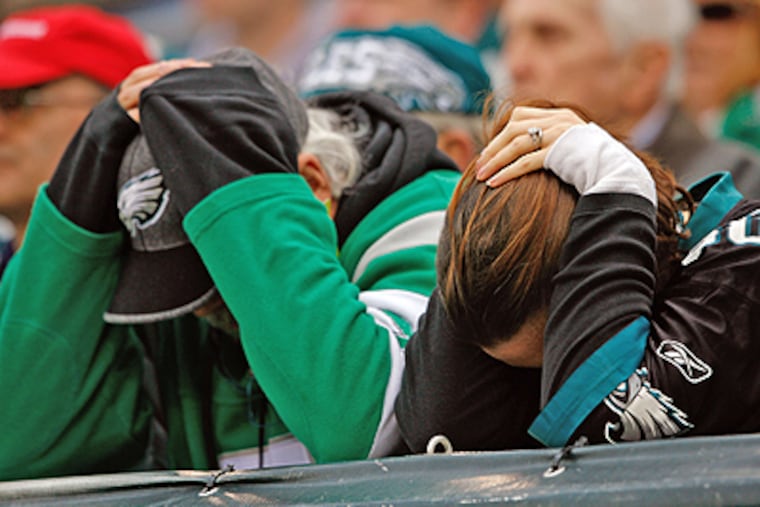
Philadelphia has been called many things.
In history books, the city is warmly mythologized as "The Cradle of Liberty." We take comfort in the knowledge that our name means "The City of Brotherly Love."
But in recent years, Philadelphia has become the target of some pretty vicious name-calling.
In 1999, Men's Health magazine saddled us with the honor of "Fattest City in America" and the insults have come fast and furious ever since.
The latest affront comes from Forbes magazine. It has just labeled us one of the Most Miserable Cities in America.
Maybe we've got a right to sing the blues.
We were named America's Most Depressed in 2005 and America's Ugliest City last summer. In December, a yogurt maker had the nerve to label us the Most Constipated in the Northeast.
Philadelphia and its suburbs ranked No. 5 out of the nation's 150 largest metro areas, scoring near the bottom in all categories used to calculate Forbes' "Misery Meter."
The magazine based its rankings on six factors: unemployment, personal income tax rates, commuting times, number of Superfund sites, violent crime, and weather.
Detroit took the dubious top honors, followed by Stockton, Calif,; Flint, Mich.; New York City, and the city formerly known as "The Most Depressed." The list is rounded out by Chicago, Los Angeles, Modesto, Calif, Charlotte, N.C., and Providence, R.I.
"How miserable is Philly?" the report asks. "The residents of the City of Brotherly Love once booed Santa Claus and pelted him with snowballs at an Eagles game."
Talk about ancient history, shot back Thomas G. Morr, president and CEO of Select Greater Philadelphia, an arm of the Chamber of Commerce that encourages businesses to move to the region.
"Philadelphia is rich with history, but it doesn't mean we should be living in the past," Morr said. "The Eagles' fans booing Santa Claus happened 40 years ago."
The magazine continues: "Maybe it's the long commutes, violent crime and plethora of toxic waste sites that has people grumpy. Philadelphia scored in the top 20 in all three areas."
Mayor Nutter's spokesman, Doug Oliver, took issue with the magazine's snarky conclusions.
"Obviously, this survey was taken last year," Oliver said. "Philadelphia is a great American city with vibrant neighborhoods and a dynamic city center."
Forbes is sticking to its guns.
So we asked, "What is misery?"
"It's defined as a state of great unhappiness and emotional distress," says the story's author, Kurt Bandhausen. "Believe me when I say we're not piling on Philadelphia. I live in the fourth worst city. I live in New York."
But if happiness is the opposite of misery, what accounts for that? What do you need for a happy city?
Eric Weiner, a correspondent for National Public Radio, recently went globe-hopping in search of an answer. He documents his journey in The Geography of Bliss: One Grump's Search for the Happiest Places in the World.
"There really isn't much difference between any two American cities," Weiner said. "The differences between Philadelphia and Reykjavík or Philadelphia and Oslo is much greater than between Philadelphia and Detroit."
The average American moves about 12 times before putting down roots, so to speak, for the rest of eternity.
"A lot of the time it's to find a happier place," he said. In the Philadelphia region, there are quite a few folks who believe that their bliss lies elsewhere.
Weiner did extensive research for his book in Asheville, N.C.
"Some people are indeed happier after moving there," said Weiner. "But most are not. Many have just dipped their toes in the water. If you don't really commit to a place and say, 'This is it, this is home,' you're unlikely to be very happy anywhere."
But when it comes to the recipe for a happy city, there's one ingredient that is more important than any other, Weiner said.
And it's not the weather.
"Trust. It's a non-negotiable thing," Weiner said. "And trust is determined by the quality of local government and the quality of relationships people have with one another."
Scientists and economists tend to agree. Trust is not only essential for happiness, it's a fundamental requirement for a functioning economy.
"Trust makes us care about each other," said Paul J. Zak, director of the Center for Neuroeconomics Studies at Claremont Graduate University in California. "Trust is internally rewarding for the same reason eating or sex feels good. Your body is telling you this is an important activity."
When someone feels he or she can trust another person, a molecule called oxytocin is released in the brain. Oxytocin, not to be confused with the drug OxyContin, is associated with love and empathy, said Zak.
"In fractionalized, unsafe or stressful environments, oxytocin is not released and we don't trust each other," Zak said. "Our happiness as social animals is reduced. How do we punish the worst of the worst, the prisoners in our jails? We put them in isolation. It's an extremely stressful punishment."
Trust is also among the strongest predictors of poverty that economists have found, Zak said. Poor countries are typically low-trust countries.
Zak, who earned his doctorate in economics in 1994 from the University of Pennsylvania, said he found "a lot of unhappiness" during the five years he lived in West Philadelphia.
"I had no money, I had a crappy car, and was only eating two meals a day," Zak said. "I was isolated from my family and friends in California. I was miserable much of the time!"
A decade later, he feels much differently about the city.
"I married a local girl," Zak said. "Now I love Philadelphia. My wife is from there."